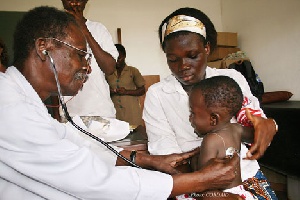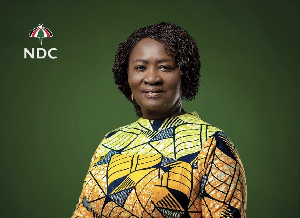Introduction
Quality health is an important ingredient for development in many economies around the globe. Countries that have a poor health care system lack the ability to produce healthy and productive citizens who can contribute positively to development. Countries found in this situation are mostly LDCs (Least Developed Countries) who lack resources to address the needs of their health care system and design policies and programs that could bring about improvements in the delivery of health services.
This is particularly important in these current times with the worldwide spread of COVID-19 which has caused severe strain on the economy of many countries - developed and developing countries.
Indeed, the current Covid-19 crisis is calling for more allocation of current government's budgets toward health care and to particularly make public health a priority in development planning and management of health services to ensure that, when serious pandemics of this nature we are experiencing today occurs, it can be taken care of by governments across the globe and particularly for developing countries whose healthcare systems are fragile - Ghana, South Africa, Peru, Mexico, Colombia, India, Togo, Benin, Nigeria, Mali, Sudan, Mauritius, Liberia, the Congo, Brazil, etc.
Therefore, there is the critical need for a cogent assessment of the robustness, preparedness and health needs of various economies to ensure that, we are ready and capable of containing such crises.
Despite this precarious situation, efforts have been made to improve the health care systems in many LDCs during this crisis through the support of domestic resources and financing, local industries and institutions and also from the International Community, The World Bank, The World Health Organization and many Non-governmental Organizations. Yet these efforts, in some LDCs have yield mixed results.
While countries like Ghana, Nigeria, Togo, Benin, etc., have been reported to be making great strides in improving their health systems and controlling the spread of Covid-19 and other health challenges, others like Somalia, Mauritius, Brazil, etc. are struggling.
Thus, there is the need for a new strategy to improve the health care system in LDcs to deliver quality health services to the general population. This is particularly paramount as many nations around the world have adopted the Millennium Development Goals (MDG) which aims at reducing child mortality; improving maternal health; and combating HIV/AIDS, Malaria and other diseases by the year 2015 and beyond (United Nations 2000). That said, this Covid-19 crisis has been challenging and more support is needed for public health agencies across many nations around the globe to effectively manage this pandemic.
But interestingly, this pandemic has also called into question what premiums in general, do governments in the developed and developing world place on healthcare.
Literature Review:
In response to the question above, the Global Health Institute says, "when it comes to global health, there is no 'them'... only 'us". While Martin Luther King Jr. says "of all of the forms of inequality, injustice in health is the most shocking and the most inhumane". Adding his voice to this argument, Danny Glover stresses that "... leadership has to be focused on some very radical ideas that only we as 21st Century people can talk about: making sure people have a livelihood, making sure people receive a living wage, making sure the environment, the Mother Earth, is embraced and cherished and not destroyed. Making sure people are healthy in what they eat, making sure we hold people and corporations accountable for the damage they do not only to our environment but to our institutions." In the same line of thinking and talking about the importance of health to ordinary people, Harrison Ford indicates that, "our health relies entirely on the vitality of our fellow species on Earth."
While Michael J. Fox says "medical science has proven time and again that when the resources are provided, great progress in the treatment, cure, and prevention of disease can occur.
Paul Farmer on the other hand argues that "...in a world riven by inequity, medicine could be viewed as social justice work." He further stresses that, “If access to health care is considered a human right, who is considered human enough to have that right?” Again, Paul Farmer points out that "clean water and health care and school and food and tin roofs and cement floor, all of these things should constitute a set of basics that people must have as birthright".
While Jeffrey Sachs, a former director at the World Bank and a current Professor of Economics at Columbia University says “the essence of Africa's crisis is fundamentally its extreme poverty and therefore its inability to mobilize out of its own resources even the barest of minimum resources to address any of the public health crises that Africa faces. For example, Ghana had to borrow from the International Monetary Fund to support the management their current Covid-19 program (as at end-June 2020, the government had spent a total of GH¢1,937 million on direct COVID-19 related expenditures, the Minister of Finance, Mr Ken Ofori-Atta, said when he presented the mid-year review of the 2020 budget in Parliament in Accra on June 23, 2020).
In this regard, Jeffrey Sachs argues that “the time has come to end this charade. The debts are unaffordable. If they won't cancel the debts, I would suggest obstruction; you do it yourselves. Africa should say: 'thank you very much but we need this money to meet the needs of children who are dying right now so we will put the debt servicing payments into urgent social investment in health, education, drinking water, control of AIDs, Sars, Ebola, and other needs”
Arguing on similar lines with regards to health and development in the developing world, Nobel Laureate in Economics, Amartya Sen points out that, “sometimes the lack of substantive freedoms relates directly to economic poverty, which robs people of the freedom to satisfy hunger; or to achieve sufficient nutrition, or to obtain remedies for treatable illnesses or the opportunity to be adequately clothed or sheltered, or to enjoy clean water or sanitary facilities.
In other cases, the unfreedom links closely to the lack of public facilities and social care, such as the absence of epidemiological programs, or of organized arrangements for the health care or educational facilities, or of effective institutions for the maintenance of local peace and order. In other cases, the violation of freedom results directly from a denial of political and civil liberties by authoritarian regimes and from imposed restrictions on the freedom to participate in the social, political and economic life of the community”.
On the other hand, former Brazilian President Luiz Lula da Silva stressed that “well-fed people can enhance their dignity, their health and their learning capacity. Putting resources into social programs is not expenditure. It is investment”.
Robert F. Kennedy holds similar views as President da Silva and indicates that “the gross national product does not allow for the health of our children, the quality of their education or the joy of their play. It does not include the beauty of our poetry or the strength of our marriages, the intelligence of our public debate or the integrity of our public officials.
It measures neither our wit nor our courage, neither our wisdom nor our learning, neither our compassion nor our devotion to our country, it measures everything in short, except that which makes life worthwhile”. And the great John Locke points out that,” all mankind... being all equal and independent, no one ought to harm another in his life, health, liberty or possessions”.
But, Elbert Hubbard argues that “If you have health, you probably will be happy, and if you have health and happiness, you have all the wealth you need, even if it is not all you want”
Whiles on the part of Melinda Gates, she stresses that, “we started our foundation because we believe we have a real opportunity to help advance equity around the world…. to help make sure that, no matter where a person is born, he or she has the chance to live a healthy, productive life”. She further argued that, “it is still just unbelievable to us that diarrhea is one of the leading causes of child deaths in the world”.
However, it is interesting to note that, Ralph Waldo Emerson clearly indicates that, “the first wealth is health." In this regard, Erin Brockovich says “there can be no real growth without healthy populations. No sustainable development without tackling disease and malnutrition. No international security without assisting crisis-ridden countries. And no hope for the spread of freedom, democracy and human dignity unless we treat health as a basic human right”.
She further argues that “I do care a great deal about the environment, but my real work and my greatest challenge is trying to overcome deceits that end up jeopardizing public health and safety.”
Consequently, Gro Brundtland argues that “we are working towards a shared vision of the future for health among all the world's people. A vision future in which we develop new ways of working together at global and national level. A vision which has poor people and poor communities at its centre. And a vision which focuses action on the causes and consequences of the health conditions that create and perpetuate poverty”.
Gro Brundtland further stresses that, “you cannot tackle hunger, disease, and poverty unless you can also provide people with a healthy ecosystem in which their economies can grow”.
To achieve these goals some have argued that, this new strategy must pay more attention to the attainment MDGs and prioritize Public Health. Further, the strategy must focus on meeting the health needs of the poorest of poor in many developing countries as they are most vulnerable to worldwide pandemics like Covid-19 (although during the on going pandemic many advance countries have reported many more cases than developing countries.
The USA is reported to have the largest number of cases worldwide: 5,955,728 as of August 25/2020 – World Health Organization) and strengthen health care systems to be able to withstand shocks and challenges during crisis periods. Thus, in the words of Dr Donald Schwarz of the Robert Wood Johnson Foundation “we need to think upstream and differently so we can improve health rather than just improving the problems that were created in not investing”.
Recommendations
To ensure that the health sector achieves its long-term goals, the following viewpoints are recommended.
(i) Many health care systems deliver universal health care without focusing on the specific interventions for the poor. Many people in the very remote and rural areas are usually neglected by national health care plans and programs. To improve this situation, low and middle countries would have to commit more domestic financial resources to this course (For example 5% of GDP expenditure should go to public health and health sector in general.
The Covid-19 health crisis has shown how poorly public health is funded). LDCs must show political leadership, transparency and create opportunity for community involvement at both urban and rural levels.
In addition to this, there must be accountability and avoidance of any biases towards rural people in the drawing of up national health plans and programs. This will facilitate the establishment of integrated health care systems where the diverse health needs of the population within a given country are carefully examined and managed in such a way that health resources are judicious distributed between rural and urban needs.
(ii) Over the years evaluations of many health programs in low- and middle-income countries are disseminated by limited circulation reports commissioned by programs sponsors where results are seldom reported to different social groups and organizations. This makes it difficult to assess the impact various programs on populations who are studied. Lapses in such programs are rarely known or only available to few institutions and groups. Also benefit incidence results are hardly provided. Hence, one would argue that, if health programs are meant to promote development, then health outcomes of such programs should be made known to all stake holders in the health sector to promote a better understanding of health problems in developing countries and to help place emphasis on achieving health targets and meeting MDC goals and also enhancing public health.
(iii) Another reason why a new strategy is needed to improve health delivery is that, decision making has been very centralized with poor motivations of health managers and health care workers. This needs to change to bring a new direction in health care delivery particularly in LDCs and to reduce the level of migration of health care professionals from LDCs to more developed nations in search of greener pastures. Where health care systems are decentralized, with effective monitoring and control systems, there is a great likelihood that, decision making processes could be improved. This could enhance local autonomy; innovation and the development of new ideas that could help strengthen the delivery of health services at the local level and keep young and innovative health professionals at home away from the lures of living abroad.
Further, at the local level, to ensure that, the quality of primary health care and reforms of primary health are successful, there should be coherent human resource development plans at the village, district levels for retention of trained personnel in remote and rural areas. Primary health care interventions are known to be very effective at the grass root levels. Therefore, to ensure that these interventions are properly managed to reduce mortality, morbidity and disability the system must be well maintained and resourced for various programs to succeed (Gilson, Magomi and Mkangaa 1995).
(iv) It is also important for governments in LDCs and middle-income countries to redirect their resources from interventions that have high cost per DALY[i] gained to those that cost little. This could reduce the burden of disease without necessarily increasing expenditure (Hanrahan, Fuller and Singh 2007). This also has the potential to free income and other resources to other areas of the economy such as education, training, infrastructure and technological development. But one wonders how much could be gained from these savings since budgetary allocations to health in LDCs is low. For example, in Cambodia, the total health expenditure amounted to 2% of GDP in 2002, while in Ghana the percentage of GDP allocated to health care increased but remained below 1.5% of GDP in 2003 (this has not changed much over the years in Ghana). In Indonesia total health expenditure as a percentage of GDP was 3.2% in 2002, while that of Sri Lanka it was 3.7% of GDP in 2002. Considering the enormous health needs of the population in these countries these figures are low (WHO 2006).
(iv) Reforming health system and promoting diversity and competition will help improve upon the delivery of essential health services, improve immunization services, school based services, information dissemination and research, improve family planning services and malnutrition, averting deaths and reducing disabilities of both boys and girls of school going age. However, there is doubt as to how far such reforms will succeed. For example, Ghana passed the National Health Insurance Act in 2003 to establish the National Health Insurance Scheme. The aim of the Scheme was to reform health care delivery in Ghana. However since, its inception, the National Health Insurance Scheme has faced a number of constraints which among others include financing, planning, leadership, poorly designed control and coordination systems, institutional fragmentation, cost, accountability, human resources, authority and power struggles, trust, corruption, unclearly defined roles, etc. These problems have made it difficult for the National Insurance Scheme to achieve its objective of easy accessibility, affordability and universal coverage. There is doubt as to how long the Scheme can be sustainable. This example calls into question how far Health Care reforms might be successful in LDCs where the health system faces so many challenges.
(v) It is possible to argue that, some developing countries continue to rely on vertical programs, with less emphasis on people’s involvement and development of systems and infrastructure to sustain those programs. For example, although the current initiative on vaccines and immunization was designed to help countries incorporate new vaccines into their national health systems and their benefits for addressing specific communicable diseases; their fullest potential will be difficult to achieve in the absence of effective health systems and supporting infrastructures. Limited assessment of these initiatives undertaken in Mozambique, Ghana, Lesotho, and Tanzania revealed that, the infrastructure foundation needed for successful implementation and sustainability is inadequate (Brugha, Starling and Watt 2002).
Maintaining the cost of expensive new vaccines after donor support ceases also poses a serious challenge to sustainability. As with most vertical programs, analysts have expressed concern that raising poor countries’ awareness of new vaccines and immunization programs without support in implementing such programs could end up creating markets for these vaccines while doing little to tackle major health problems (Flec 2002).
(vi) To improve the health status of people in the developing world and to ensure sustainability, a revitalization of tenets of the Alma Ata’s* primary health care is needed. Of critical importance is the need to establish concrete strategies and processes, with clear targets, to reduce inequalities in the allocation of resources for primary health care and with a focus on both horizontal and vertical equity (Health System Trust 2003). The value of this proposal is illustrated by the striking success that has been achieved in social development and health by a few poor countries, notably Sri Lanka, Costa Rica, Cuba, China and Kerela state in India. Mortality and malnutrition rates are much lower and life expectancy much higher in these countries than other countries with similar economic characteristics or some wealthier or more resourced advance countries (Evans et al 2001).
(vii) Health policymakers should be aware of the effects of macroeconomic, labour, and social policies that, have the potential to limit or enhance health opportunities for different groups of the population. That is, those who are better educated can take greater advantage of these opportunities while the less educated benefit less (Mclntyre and Gilson 2000).
Conclusion
In conclusion, one would argue that, quality health is very important to human life and very critical for economic development. Unfortunately, due to many competing needs of LDCs, funding for health has been low as only a small proportional of annul budgets have been allocated to the sector. Therefore, for health to play a significant role in stimulating economic development, more resources need to be devoted to the sector. This can be done through proper planning and judicious use of scarce resources, sustainable reform programs and the political will to make this happen. Also, where there is effective collaboration between vertical and horizontal systems of health care, disease burden of the poor and rural people can be reduced. It is hope that, through these efforts the wellbeing of the population could be improved to create more opportunities for sustainable growth and development. Further, it is expected that, with effective health planning strategies in developing countries and efficient management of healthcare systems, developing countries like India, Brazil, South Africa, Togo, Benin, Burkina Faso, Botswana, Sierra Leone, Liberia, Ghana, Nigeria, etc, will become more resilient and savvy in handling pandemics like Covid-19 or any such major crisis that might occur in the future.
References
Brugha, R., Starling, M., and Watt, G. “GAVI, the First Steps: Lessons for the Global Fund,” Lancet 359, no. 9304 (2002): 435 –438.
Evans, J.R., et al (1981) “Shattuck Lecture-Health Care in the Developing World: Problems of Scarcity and Choice,” New England Journal of Medicine 305, no. 19: p:1117 –1127.
Fleck, F. (2002), “Children’s Charity Criticizes Global Immunization Initiative,” British Medical Journal 324, no. 7330: 129
Gilson, L., Magomi, M., and Mkangaa, E., (1995), “The Structural Quality of Tanzanian Primary Health Care Facilities,” Bulletin of the World Health Organization 73, no. 1: 105 –114
Hanrahan, D., Fuller, F. and Singh, A. (2007) “Cost Effectiveness and Health Impact of Remediation of Highly Polluted Sites in the Developing World.
http://www.blacksmithinstitute.org/docs/costEff1.pdf assessed on 25/08/2020
McKeown,T. (1979), The Role of Medicine: Dream, Mirage, or Nemesis? , Princeton, N.J.: Princeton University Press.
United Nations (2000) “Millennium Declaration”, UN General Assembly, New York.
WHO (2006) “Health Expenditure trends in selected Countries: Electronic Annex C: to the report tough choices: Investigating in Health for Development, Experience from National –follow ups to the commission on Macroeconomic and Health”, Geneva, The World Health Organization.
http://www.who.int/macrohealth/documents/Electronic_Annex_C.pdf assessed on 25/08/2020
End Note:
[i] “The essence of the approach lies in the concepts of DALY (disability adjusted life years) and QALY (quality adjusted life years), both of which calculate the years of “healthy life” lost due to the impacts of a particular cause or disease, in a specified area. Once this measure of health impact has been estimated, the benefits and cost-effectiveness of different interventions and projects can readily be evaluated.
The methodology has been developed and refined by WHO as part of their “Burden of Disease” program and is widely accepted by both the health sector and the regulatory agencies (such as USEPA) as a basis for making decisions on investments in disease prevention and pollution control”( Hanrahan, Fuller and Singh 2007)
* The Declaration of Alma-Ata was adopted at the International Conference on Primary Health Care (PHC), Almaty (formerly Alma-Ata), Kazakhstan (formerly Kazakh Soviet Socialist Republic), 6–12 September 1978. It expressed the need for urgent action by all governments, all health and development workers, and the world community to protect and promote the health of all people.
- Ministry of Health donates ambulances to four government institutions
- About 30% of children with autism spectrum disorder are minimally verbal - Report
- Parenting with a difference 101: Good food, good childhood and great adulthood
- KATH introduces revolutionary GH¢15,000-per-patient treatment that 'cures' stroke
- Pius Hadzide registers over 1000 people under NHIS in Asuogyaman
- Read all related articles













